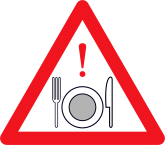Eating Disorders
5 Warning Signs for Detecting Eating Disorders in Athletes
How do you recognize the symptoms of anorexia and bulimia?
Posted September 15, 2018

Athletes usually are concerned about looking good, and they all want to perform well. Most of the time, these factors motivate them to work hard at conditioning their bodies and perfecting their skills. But sometimes, in to attain these goals, athletes resort to self-destructive methods that result in serious medical disorders, such as anorexia and bulimia. Anorexia is defined by an abnormally low body weight, an intense fear of gaining weight, and a distorted perception of weight. Bulimia is characterized by periods of binging—or excessive overeating—followed by purging.
In some thin-build sports (e.g., figure skating, gymnastics) and in some weight-regulated sports (e.g., wrestling) the incidence of eating disorders is alarmingly high. Various sports medicine studies report rates of eating disorders as high as 60 percent, with disorders occurring in athletes as young as 8 or 9 years of age.
It is essential to recognize that such maladies are not restricted to athletes in the sports mentioned above. Athletes in all sports are at risk for eating disorders.
Unhealthy weight-control can involve the use of methods that can have devastating effects on the body. The harmful techniques include the following:
- Diuretics (substances that cause excess water excretion).
- Laxatives.
- Self-induced vomiting.
- Excessive and compulsive aerobic exercise.
- Dieting that approaches self-starvation.
Because of the health-related risks, parents and coaches should be alert for the following warning signs of a developing eating disorder:
- Excessive preoccupation with being “fat,” especially in an athlete who is normal weight.
- Unusual eating habits, particularly signs of excessive (and often secret) food intake—the first part of the binge-purge pattern of bulimia.
- Evidence of purging with laxatives or by vomiting. One sign of repeated vomiting may be sores at the corner of the mouth or on the tongue caused by stomach acid.
- Food avoidance or severe caloric restriction.
- Alternating periods of fatigue and irritability.
If parents or coaches detect one or more of these signs, they should initiate the remediation process. For comprehensive information about eating disorders and evidence-based treatment, go to the website of Families Empowered and Supporting Treatment of Eating Disorders.
Do you want to learn more about coaching and parenting young athletes?
- The Mastery Approach to Parenting in Sports and Mastery Approach to Coaching are evidence-based videos that emphasize skill development, achieving personal and team success, giving maximum effort, and having fun.
- To access the videos, go to the Youth Enrichment in Sports website.


